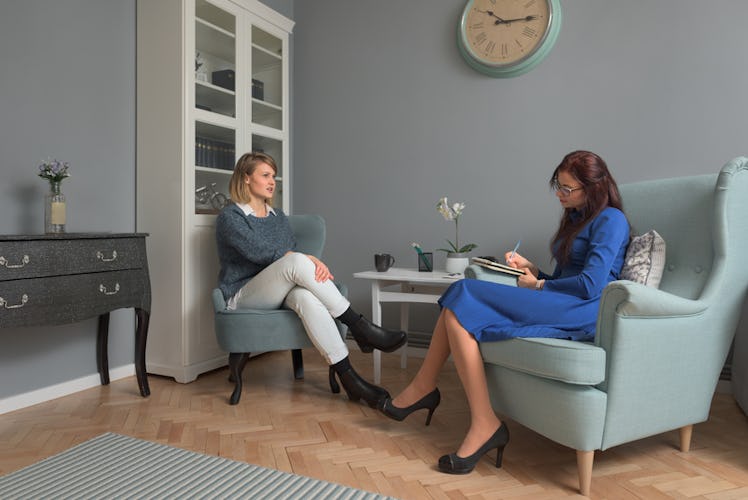
How To Convince Your Partner It's Time To Give Couples' Therapy A Shot
If you're experiencing problems in your relationship that you just can't seem to work through on your own, you might consider going to couples' therapy. Bringing up the concept of therapy with your partner can be scary, especially if you've never seen a therapist (either individually or together as a couple). If you find that your significant other is resistant to the idea, initiating this conversation could be tough. When you're ready to discuss the possibility of consulting with a professional, but you're not quite sure how to talk about couples’ therapy with your partner, don't panic. There are a few steps you can take to help your S.O. understand why you think therapy is a good idea, in a clear and non-confrontational way.
In the event that they need a little extra push in the right direction, gently remind them that this doesn't mean your relationship is over. In fact, the earlier you two commit to couples' therapy, the better the outlook will likely be. The longer you wait, the more problems build up, and the harder it becomes to work through the long-ignored issues. I spoke to a couples' therapist about the best strategies for convincing your partner to give couples' therapy a try. Here's what she had to say.
Be Vulnerable And Real
It's common for one partner to be more ready for couples' therapy than the other. "It's okay to have resistance to coming in for therapy as a lot of people have a lot of ideas in their minds about what it means about the relationship to seek couples' therapy. The truth is, most couples don't love the idea of going to therapy because it usually shows that something isn't quite working in their relating to one another," says Melissa Divaris Thompson, licensed marriage and family therapist. The key is to allow yourself to be vulnerable and express your true feelings to your partner.
Honestly Explain The Issue And How It Makes You Feel
In dealing with a partner who isn't convinced that therapy is the way to go, Thompson suggests being as honest as possible about the challenges you are experiencing. "State the problem and how it is impacting you in relation to the relationship," she says. "For example, 'When we fight, I am unable to recover for a week. The things we say to each other are unkind and I want to be happier and in more peace with you.'" By explaining specifically how conflict affects you, your S.O. can more clearly see your point of view.
State A Goal
Next, verbally set a goal that you'd like to work toward in your sessions. "Perhaps you want to laugh more or feel how you used to feel in relationship with your partner. We all know that relationships shift and change but it's realistic to want some of that back. Share honestly and openly about your goals however small and hear your partner's as well," says Thompson. Deciding on a mutual goal will give you a shared sense of purpose.
Remind Them Of The Benefits
Couples' therapy has a number of benefits, so be sure to point those out to your partner. From building more effective communication skills, to rediscovering your passion for each other, a couples' therapist can provide a safe space to help you talk out your problems. According to Thompson, major benefits include "feeling more connected, like you are part of a team rather than on your own, feeling more confident in yourself and your life overall, and [gaining a] deeper understanding of yourself and each other."
If you find that your feelings are easily hurt by your S.O., small arguments often turn into big fights, or you don't have the sexual chemistry and intimacy you once did, couples' therapy could be just what the doctor ordered.
Tell Them It Can Be Preventative, Rather Than A Last Resort
Your partner may be afraid that seeking outside support means your relationship is doomed or failing, but this is not always the case. "No one comes with a manual on how to relate to each other and every two people come with their own baggage. Couples' therapy helps couples communicate better, feel more connected, and gives tools on how to argue better as arguing will also be a part of any relationship," says Thompson. Remind your partner that therapy can solve current issues and help prevent further problems down the road.
More than simply showing up, being invested in your progress as a couple is what will carry you through the time in between sessions. You both need to go in with an open mind and a willingness to do the work. "I often find that if both people show up there is something motivating them to be there. My role is to help couples find out what that goal is for each of them," says Thompson. "Both parties usually have contributed to the issue in some way and need to take responsibility and ownership to work on things while also being clear about their goals are in terms of what they want." Thompson also emphasizes the importance of actually practicing the tools you learn in therapy, outside of your therapist's office.
By being vulnerable, honestly sharing your feelings and goals, and discussing the benefits of couples' therapy, you can help your partner understand how working with a couples' therapist can improve not only your relationship, but your overall happiness as well.